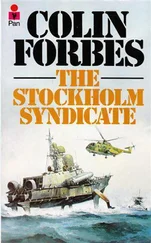Colin Forbes - The Leader And The Damned
Здесь есть возможность читать онлайн «Colin Forbes - The Leader And The Damned» весь текст электронной книги совершенно бесплатно (целиком полную версию без сокращений). В некоторых случаях можно слушать аудио, скачать через торрент в формате fb2 и присутствует краткое содержание. Жанр: Шпионский детектив, на английском языке. Описание произведения, (предисловие) а так же отзывы посетителей доступны на портале библиотеки ЛибКат.
- Название:The Leader And The Damned
- Автор:
- Жанр:
- Год:неизвестен
- ISBN:нет данных
- Рейтинг книги:3 / 5. Голосов: 1
-
Избранное:Добавить в избранное
- Отзывы:
-
Ваша оценка:
- 60
- 1
- 2
- 3
- 4
- 5
The Leader And The Damned: краткое содержание, описание и аннотация
Предлагаем к чтению аннотацию, описание, краткое содержание или предисловие (зависит от того, что написал сам автор книги «The Leader And The Damned»). Если вы не нашли необходимую информацию о книге — напишите в комментариях, мы постараемся отыскать её.
The Leader And The Damned — читать онлайн бесплатно полную книгу (весь текст) целиком
Ниже представлен текст книги, разбитый по страницам. Система сохранения места последней прочитанной страницы, позволяет с удобством читать онлайн бесплатно книгу «The Leader And The Damned», без необходимости каждый раз заново искать на чём Вы остановились. Поставьте закладку, и сможете в любой момент перейти на страницу, на которой закончили чтение.
Интервал:
Закладка:
'We're even going to the same headquarters – Felsennest – as Hitler used in 1940,' Jodl continued. 'The Eagle's Eyrie. I find that an unsettling omen for Autumn Fog…'
' Gentlemen! ' It was. Bormann calling out from the end of the coach. 'Conference in the Fuhrer's quarters. At once, if you please. Breakfast will wait.'
'Breakfast will get cold,' Keitel muttered.
Autumn Fog dissipated. Literally. While fog shrouded the forests of the Ardennes the Panzer divisions advanced, breaking through towards the vital bridges over the river Meuse, as they had in May 1940.
Then the weather changed. The skies cleared and the overwhelming might of the Allied air forces pounded the Panzers, forcing both the German Panthers and Tigers to retreat. Hitler seemed to have lost his military flair.
Hitler arrived at Felsennest on 11 December 1944. He left the place for Berlin on 15 January 1945 with his entourage – including the inevitable trio; Bormann, Jodl and Keitel. He was never to leave Berlin alive.
30 April 1945. Berlin was in flames. Smoke and falling ashes mingled with the red glare of the inferno. The Red Army was advancing into the centre of the city, was very near the underground bunker where Hitler and Eva Braun had committed suicide.
Their bodies, carried up into the courtyard outside the bunker, had been liberally soused with petrol and set alight: Nothing was now left except their bones.
Panic gripped the remaining members of his entourage as they tried to find a route to escape from the Russians, to surrender to the Allies. In the early hours of 1 May Martin Bormann joined a group of fellow-escapers.
They planned to make their way along the underground rail track from the station below the Wilhelmplatz. Out of sight of any Russian patrols in the streets above, they would emerge again above ground at the Friedrichstrasse station. From there they would cross the river Spree and slip through the Russian lines.
The plan went wrong from the beginning. The city, bombarded by Soviet guns, was in ruins, the streets littered with giant pieces of masonry; there was hardly a single intact building in sight. Dust from powdered masonry was everywhere, coating their clothes, polluting their mouths.
'We must keep moving,' Bormann. told Artur Axmann, a Hitler Youth leader. 'Get behind that tank – it will shield us from Russian small arms fire..
They stumbled on through the night, using the German tank as a mobile wall as it fired repeatedly into the enemy lines. Night was turned into day by the incessant blood-red flares drifting down from above. The noise was an assault on the ear-drums. The detonation of Russian shells exploding. The crash of one of the few remaining buildings collapsing, walls heaving outwards, crumbling in the streets. The Asiatic hordes had now over-run one of the West's greatest capitals.
'Get down!' Bormann warned.
There was a sinister hissing noise. Something struck the tank they had been following. It stopped, bursting into a searing flame Bormann's uniform was blackened with smoke, smeared with filth. Leaving Axmann crouched behind a pile of rubble Bormann pressed on.
The last Western witness who saw Bormann alive was an SS Major Joachim Tiburtius who was dose to the Reichsleiter and his companion when the tank was destroyed. He couldn't see Bormann after the explosion and made his way towards the German lines which were still holding.
Fifteen minutes later Tiburtius, alone in the hell Berlin had become, saw one building still intact among its neighbours which were silhouetted against the flaming glare like jagged teeth. The Hotel Atlas. He entered the building. In the lobby he paused in sheer astonishment.
Martin Bormann was- walking across the lobby towards the exit. That he should have survived was a miracle. But he was no longer wearing his uniform. Somewhere he had found a suit of civilian clothes. Major Tiburtius waited eight years before he reported what he saw that night. His story was printed in the Berne newspaper Der Bund in the issue of 17 February 1953.
He (Bormann) had by then changed into civilian clothes. We pushed on together towards the Schiffbauerdamm and the Albrechtstrasse. Then I finally lost sight of him…
Stalin himself had despatched to Berlin the special, highly secret unit of the Red Army charged with a dual task. An unusual aspect of the unit of eleven, heavily-armed men, was the fact that an interpreter was attached to it – and that this individual was a woman, Yelena Rzhevskaya.
Even stranger was the fact that the real commander of this unit was Yelena. For her first task she had been personally instructed by Stalin to find Hitler 'alive or dead…'
Barely one kilometre from the Hotel Atlas, Bormann walked straight into the arms of this unit.
He stood quite still as the unit surrounded him, aiming their machine-pistols. He was astounded when Yelena appeared and addressed him in fluent German.
'You are Martin Bormann?'
'That is so.'
'And where shall we find Hitler?' she asked.
'Outside the underground bunker by the ruins of the new Chancellery. I can tell you how to get there…'
'It will not be necessary,' Yelena interjected, 'we have our map of the whole of Berlin.'
'Only his bones are left,' Bormann continued. 'They poured petrol over the bodies…'
'Bodies?'
'Eva Braun was burnt beside him. They got married just before…'
'You can tell us the details later,' she said brusquely. She gave brief orders in Russian to the unit and seven of the eleven men in Red Army uniform disappeared. 'Now, Mr Martin Bormann,' continued Yelena, 'you will come with us. A plane is waiting to fly you to Moscow.'
The Russian aircraft carrying Yelena, Bormann and the four other members of the special unit landed at a military airfield outside Moscow. Two large black limousines were waiting, their windows masked with amber-coloured net curtains.
'You sit in the back with me,' Yelena informed Bormann.
It was still dark, the gloomy dark of early morning with a sky full of snow, when the first limousine entered the Kremlin. The Reichsleiter peered curiously out, remembering Ribbentrop's description of this strange place after his return from signing the Nazi-Soviet Pact in August 1939 which triggered off the outbreak of the Second World War.
The limousine, which had moved at nerve-racking speed on the drive from the airfield, now barely crawled as it moved slowly into the mysterious inner city. Bormann had the odd feeling he was leaving life itself behind.
The limousine drove across a courtyard past the largest cannon of its day – so enormous that no one had ever dared fire it. He stared at the little wooden houses and cathedrals which formed a world all their own. Finally the limousine pulled up outside a modern administration block. Yelena ushered him inside. Stalin was waiting for them. The only other occupant of the small room was Laventri Beria. The Soviet chief, dressed in his full uniform of Generalissimo, waited until Yelena had left before he spoke, his tone quite casual, a malicious glint in his yellowish eyes.
'This,' said Stalin, pointing at Bormann, 'is Woodpecker.'
Beria was speechless. Word that a special unit had been sent to Berlin had reached his all-hearing ears and he had wondered why the NKVD had not been used. Now he began to understand. He fiddled with his pince nez before he reacted, staring at Martin Bormann who no longer looked like a dwarf. Stalin and the German were of approximately the same height and build.
'So you had a pipeline right into Hitler's headquarters…'
'From the moment he launched his attack on us… 'But it seemed to take you a long time to believe me,' Bormann remarked petulantly.
Beria's normally impassive face froze. No one interrupted Stalin. The Generalissimo seemed unperturbed by the gross impertinence. He pulled at the end of his moustache and his expression was crafty.
Читать дальшеИнтервал:
Закладка:
Похожие книги на «The Leader And The Damned»
Представляем Вашему вниманию похожие книги на «The Leader And The Damned» списком для выбора. Мы отобрали схожую по названию и смыслу литературу в надежде предоставить читателям больше вариантов отыскать новые, интересные, ещё непрочитанные произведения.
Обсуждение, отзывы о книге «The Leader And The Damned» и просто собственные мнения читателей. Оставьте ваши комментарии, напишите, что Вы думаете о произведении, его смысле или главных героях. Укажите что конкретно понравилось, а что нет, и почему Вы так считаете.












